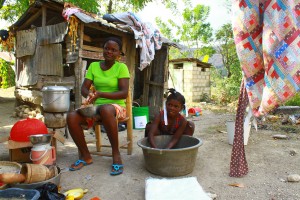June 3, 2010
After the International Donors’ Conference in New York, DARA welcomes the outpouring of support but urges donors to address persistent and urgent humanitarian needs.
On January 12th, an earthquake ripped through Haiti and in just 35 seconds killed an estimated 250,000 people, wounded hundreds of thousands of others, and left over one million homeless. Haiti’s capital, Port-au-Prince, was left in ruins.
The immediate humanitarian response on the ground was a logistical “perfect storm”, with major infrastructure devastated and international aid teams based in Haiti decimated by the earthquake. In the aftermath of the disaster, some countries sent humanitarian supplies and rescue teams to Haiti. Millions of dollars were raised by governments, organisations and individuals.
Between 900,000 and 1.2 million Haitians were left homeless and moved to temporary camps set up around Port-au-Prince. Providing shelter materials to this population remains a top priority. Sanitation is also a major concern. The current conditions in the camps increase the risk of outbreaks of malaria and dengue. As the hurricane season approaches, the situation of hundreds of thousands of people is still extremely precarious.
[youtube _bYK0j0YZfA 650 400]Haiti is facing enormous challenges
On March 31st, the international community came together in New York City to put together a plan to rebuild Haiti. Over 150 nations and institutions attended the Donors’ Conference for Haiti’s Reconstruction at UN headquarters. Donors pledged close to $10 billion. Of that amount, $5 billion were promised for 2010 and 2011, exceeding the established $4 billion target. The largest contributions came from the European Union and the United States.

Haiti / Two girls from earthquake zone living in a host family washing and cooking. / UNHCR / J. Björgvinsson / March 2010
Haiti context and recommendations
The first $4 billion will be destined in the next 18 months to rebuild destroyed infrastructure, including government buildings, hospitals and schools.
DARA considers that these commitments by donors are important and reflect their recognition of the enormous challenges that lie ahead, but cautions that the pledges were not matched by specific operational plans and changes in aid provision. In that sense, the conference raised questions about whether donors’ commitments will translate into meaningful improvements in the lives of Haitians who need the most urgent help.
Another key issue raised during the Conference was the international community’s capacity and approach to the rebuilding of what has been considered to be a failed state as the immediate relief needs of millions of Haitian people are still unmet.
For that purpose, donors have also been called to respond to the $1.44 billion UN appeal for food aid and emergency shelter. The hurricane and rainy seasons are already underway, putting at risk an estimated 1 million Haitians made homeless by the earthquake.
A decentralization plan
Haiti lost more than 100,000 homes in the earthquake, and replacing lost housing is a top priority for the Haitian government and for the international community’s reconstruction plan. Both the Haitian government and donor countries insist that a decentralisation strategy is at the heart of the reconstruction plan. This plan aims to carry out reconstruction projects in parts of the country that are less vulnerable to natural disasters than Port-au-Prince.
Haitian president René Préval wants to use the reconstruction plan as an opportunity to decongest an overcrowded capital and revitalize the country’s agriculture. But weeks after the earthquake, those who left Port-Au-Prince are already returning to the capital. Relief aid was very slow in reaching rural areas, and Haitians probably suspect that things will not be any different in the reconstruction phase.
A better Haiti
In some aspects, the Haiti donors’ conference went far beyond the issue of rebuilding the physical structures destroyed by the earthquake. DARA, whose Director General Ross Mountain led a team to Haiti to provided technical assistance to the Spanish Agency for International Development Cooperation in the aftermath of the earthquake, believes that there is a clear opportunity for Spain and the EU to play a pivotal role in defining how the aid will be structured. Spain can also play an important role in the Interim Haiti Recovery Commission (IHRC), which will be co-chaired by Haitian Prime Minister Jean-Max Bellerive and former U.S. President Bill Clinton, and where Spain has both a presence and voting rights.
The IHRC will be tasked with coordinating efforts and with ensuring transparency and accountability throughout the process. These are seen as key steps to assuage donor concerns about corruption and political unrest, problems that have historically plagued Haiti. Furthermore, key actors should agree upon a common action plan and an agenda that reach beyond the physical reconstruction of Haiti and aim towards the creation of a new country.
Ross Mountain underscored that “the magnitude of the devastation in Haiti and the complexity of the situation on the ground demands that humanitarian actors improve their current mode of operation. The success of the plan to build a ‘better Haiti’ will depend on how Haiti’s leaders will manage their responsibilities and coordinate reconstruction efforts with donors, the UN and the international development and humanitarian community. The effective use of international aid requires a clear disbursement strategy from donors, a better financial tracking system and close coordination among all actors, including recipients”.
Mountain also stressed that “the first step to building a ‘better Haiti’ is to address immediate humanitarian needs, which will help to create a stable environment, increase respect for human rights and ensure basic protection for the population”.
Share this